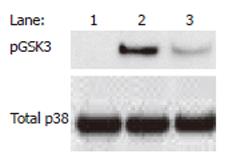Copyright
©2006 Baishideng Publishing Group Co.
World J Gastroenterol. Dec 14, 2006; 12(46): 7451-7459
Published online Dec 14, 2006. doi: 10.3748/wjg.v12.i46.7451
Published online Dec 14, 2006. doi: 10.3748/wjg.v12.i46.7451
Figure 5 Nicotine-treated human monocytes exhibit augmented levels of phosphorylated (Ser9) GSK3-β in monocytes stimulated with the Gram negative bacterium, Porphyromonas gingivalis.
Monocytes were pre-treated for 2 h with 100 ng/mL of nicotine and stimulated for 60 min with P. gingivalis (MOI = 10). Western blot was performed using whole-cell lysates (20 μg) and probing for GSK3 using a phospho-specific GSK3-β (Ser9; denoted pGSK3) antibody. Blot was stripped and re-probed for total p38 to ensure equivalent loading. Lane 1: Nonstimulated; Lane 2: P. gingivalis + Nicotine; Lane 3: P. gingivalis. Data are representative of three experiments.
- Citation: Scott DA, Martin M. Exploitation of the nicotinic anti-inflammatory pathway for the treatment of epithelial inflammatory diseases. World J Gastroenterol 2006; 12(46): 7451-7459
- URL: https://www.wjgnet.com/1007-9327/full/v12/i46/7451.htm
- DOI: https://dx.doi.org/10.3748/wjg.v12.i46.7451









